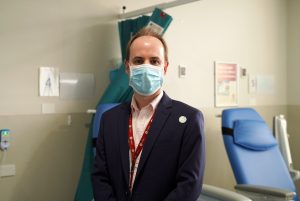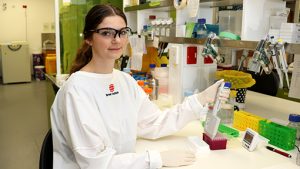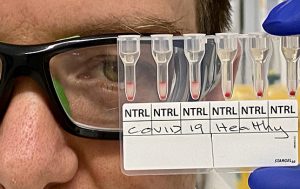Better understanding the impact of COVID-19 on patients; important responses like an Intelligent Home Monitoring system and a 20 minute virus detection test; a new drug to block formation of killer clots; tackling a deadly condition which looks like epilepsy…but isn’t; contributing to policy on ambulatory blood pressure monitors and the government’s COVID response; recognition for researchers in physical activity and malaria; and baseball home runs deconstructed: Here’s some of what has happened this week across the Alfred Research Alliance.
ALFRED HEALTH
Intelligent Home Monitoring to Help Prevent COVID-19 Deaths
COVID a Threat to Vital Organs
 As medical specialists learn more about COVID-19, it’s becoming increasingly clear that this is not a normal respiratory virus. Alarming complications are becoming evident in seriously ill COVID-19 patients, including life-threatening blood clots in the lungs, heart and brain. Haematologist Dr James McFadyen, pictured, says, “It is now very clear, COVID-19 is much more than just the flu. COVID-19 can be life-threatening and can also have serious long-term implications for your health.” Find out more…
As medical specialists learn more about COVID-19, it’s becoming increasingly clear that this is not a normal respiratory virus. Alarming complications are becoming evident in seriously ill COVID-19 patients, including life-threatening blood clots in the lungs, heart and brain. Haematologist Dr James McFadyen, pictured, says, “It is now very clear, COVID-19 is much more than just the flu. COVID-19 can be life-threatening and can also have serious long-term implications for your health.” Find out more….
BAKER INSTITUTE
Translating Research into Policy – Blood Pressure Monitoring
Ambulatory blood pressure monitoring devices could soon be publicly funded in a move that could curb both the under- and over-diagnosis of hypertension, thanks to work spearheaded by Baker Institute’s Geoff Head and the High Blood Pressure Research Council of Australia. This follows an application made by the HBPRCA requesting MBS listing of ambulatory blood pressure monitoring for patients with a clinic blood pressure measure of ?140/90 mmHg and ?180/110 mmHg. The application was endorsed by the Heart Foundation, Royal Australian College of General Practitioners and Cardiac Society of Australia and New Zealand. View the application…
David Dunstan Appointed VP of New Australasian Society for Physical Activity
 Congratulations to David Dunstan (left), recently named inaugural Vice-President of the newly formed Australasian Society for Physical Activity (ASPA). The society is the brainchild of David’s long-time research collaborator Jo Salmon, Director of the Institute for Physical Activity and Nutrition at Deakin University, and now ASPA president, who recognised the need for a network to bring together researchers and practitioners across all areas of physical activity. Baker Institute PhD candidate, Ashleigh Homer, will sit on the communications sub-committee of the new Society.
Congratulations to David Dunstan (left), recently named inaugural Vice-President of the newly formed Australasian Society for Physical Activity (ASPA). The society is the brainchild of David’s long-time research collaborator Jo Salmon, Director of the Institute for Physical Activity and Nutrition at Deakin University, and now ASPA president, who recognised the need for a network to bring together researchers and practitioners across all areas of physical activity. Baker Institute PhD candidate, Ashleigh Homer, will sit on the communications sub-committee of the new Society.BURNET INSTITUTE
Thrasher Award to support malaria vaccine research

Burnet Institute Postdoctoral Research Officer Dr Liriye Kurtovic (left) has won a prestigious Thrasher Research Fund Early Career Award to support her research into the development of a world-first effective malaria vaccine. Malaria is one of the leading contributors to childhood mortality and was responsible for 272,000 deaths in children under 5 in 2018 alone. Dr Kurtovic’s project, Validating immune correlates of protection in children to advance malaria vaccines, will build on past Burnet work by using novel approaches to evaluate immunity in paediatric clinical trials of the RTS,S malaria vaccine. Read more…
MONASH PUBLIC HEALTH & PREVENTIVE MEDICINE
Breakthrough COVID-19 Test Can Detect Virus in 20 Minutes
 World-first research, led by Monash University, has been able to identify positive COVID-19 cases using blood samples in approximately 20 minutes, and identify whether someone has contracted the virus. The study, Monash Engineering researchers collaborated with clinicians at Monash Health including Erica Wood and Zoe McQuilten from Monash Epidemiology and Preventive Medicine to collect blood samples from people recently infected with COVID-19, as well as samples from healthy individuals sourced before the pandemic emerged. Read the full article here.
World-first research, led by Monash University, has been able to identify positive COVID-19 cases using blood samples in approximately 20 minutes, and identify whether someone has contracted the virus. The study, Monash Engineering researchers collaborated with clinicians at Monash Health including Erica Wood and Zoe McQuilten from Monash Epidemiology and Preventive Medicine to collect blood samples from people recently infected with COVID-19, as well as samples from healthy individuals sourced before the pandemic emerged. Read the full article here.
.
New Survey into Living with COVID-19
Monash SPHPM has released a second survey into how Australians are coping with COVID-19. In April, some 14,000 respondents helped Monash SPHPM inform government about life during the pandemic and advise on the most useful policy responses. This survey will add to that, including exploring the impact of restrictions being lifted – and reimposed – in different areas of the country.The survey is completely anonymous and open to anyone 18+ living in Australia, so please feel free to complete yourself and to share with others. Take the survey…
MONASH CENTRAL CLINICAL SCHOOL
Deadly Condition Looks Like Epilepsy…But Isn’t
 One in four people who are tested for epilepsy do not have the disease but instead have a psychological condition called psychogenic non-epileptic seizures (PNES). This week in the prestigious journal, Neurology, Monash researchers including Professor Terry O’Brien, Head, Department of Neuroscience & Head at Monash CCS, says the similarity in presentation betweeen PNES and epilepsy can lead to misdiagnosis and inappropriate treatment. Professor O’Brien works with Dr Toby Winton-Brown, a neuropsychiatrist at Monash University and Alfred Health, who has started Australia’s first PNES Clinic in Australia at the Alfred Hospital. According to Professor O’Brien, people with PNES have a similar mortality rate to those with drug-resistant epilepsy. “This emphasises the importance of prompt diagnosis, identification of risk factors, and the implementation of appropriate strategies to prevent potential avoidable deaths.” Read more…
One in four people who are tested for epilepsy do not have the disease but instead have a psychological condition called psychogenic non-epileptic seizures (PNES). This week in the prestigious journal, Neurology, Monash researchers including Professor Terry O’Brien, Head, Department of Neuroscience & Head at Monash CCS, says the similarity in presentation betweeen PNES and epilepsy can lead to misdiagnosis and inappropriate treatment. Professor O’Brien works with Dr Toby Winton-Brown, a neuropsychiatrist at Monash University and Alfred Health, who has started Australia’s first PNES Clinic in Australia at the Alfred Hospital. According to Professor O’Brien, people with PNES have a similar mortality rate to those with drug-resistant epilepsy. “This emphasises the importance of prompt diagnosis, identification of risk factors, and the implementation of appropriate strategies to prevent potential avoidable deaths.” Read more…
New Drug Blocks Formation of Killer Clots to Prevent Stroke & Heart Attacks
Monash researchers have found a potential drug that can be given as a preventive against heart attack. In a paper published in the prestigious journal, Science Translational Medicine, lead researcher Associate Professor Justin Hamilton, from Monash University’s Australian Centre of Blood Diseases (ACBD) says the drug, which has been studied in human cells and animal models – literally blocks the minute changes in blood flow that precede a heart attack and acts on the platelets preventing the platelet-triggered clot from forming before it can kill or cause damage. Read more…
What’s Behind the Home Run Surge in Baseball?
Professor Meng Law from the Department of Neuroscience at Monash CCS, has co-authored an article which turns out to have hit the spot in terms of both public and scientific interest. Physicochemical Investigation into Major League Baseballs in the Era of Unprecedented Rise in Home Runs is one of 50 featured in a special ‘virtual issue’ from the American Chemical Society (ACS) Omega publishing group, Celebrating 5 Years of Open Access with ACS Omega. See the virtual issue here…
